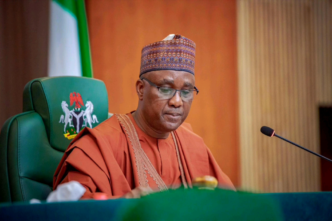HB. 1320
A BILL FOR AN ACT TO ALTER THE PROVISIONS OF THE CONSTITUTION OF THE FEDERAL REPUBLIC OF NIGERIA, 1999 TO ALTER THE OATH TAKING OF THE MEMBERS OF THE NATIONAL ASSEMBLY AND MEMBERS OF STATE HOUSES OF ASSEMBLY IN SECTIONS 52, AND 94 OF THE CONSTITUTION OF THE FEDERAL REPUBLIC OF NIGERIA AND FOR RELATED MATTERS. Bill Sponsor: Hon. Sada Soli Jibia. Bill Progress: Committee Stage
This Bill seeks to alter Sections 52 and 94 of the Constitution to ensure that members of Senate/House of Representatives and House of Assembly cannot be denied or obstructed from taking their Oath of Office, hence the moment a member has received his or her Certificate of Return from INEC, He or She shall automatically be admitted as a member and shall instantly enjoy all rights, privileges, powers and duties of the office.
In recent events, community leaders have mobilized to address pressing local issues, aiming to drive progress and foster stronger neighborhood ties. With a focus on community engagement, these efforts are gathering momentum, signaling a shift in how local residents approach shared challenges.
The initiative, spearheaded by local nonprofit organizations and supported by concerned citizens, aims to tackle various issues ranging from environmental sustainability to public safety. The organizers have expressed a commitment to inclusivity, ensuring that diverse voices are heard and represented throughout the planning and implementation processes.
One of the key components of this movement is a series of community meetings designed to gather input from residents. These gatherings not only serve as a platform for residents to express their concerns but also foster a sense of unity among participants. During the last meeting, held at the community center, residents discussed the deteriorating state of local parks and recreational facilities, calling for immediate action to improve these essential communal spaces.
In addition to enhancing recreational facilities, residents are advocating for environmental initiatives that aim to increase green spaces throughout the area. Supporters of environmentally-friendly practices believe these changes could lead to improved public health and increased property values. Participants are already drafting proposals for community gardens, tree planting events, and educational workshops focused on sustainable living. Local environmentalists have joined the cause, emphasizing the importance of preserving natural habitats and promoting biodiversity within urban settings.
Another pivotal discussion point has revolved around public safety. Community members have raised concerns about rising crime rates and the perceived lack of adequate policing in certain neighborhoods. Residents are requesting better collaboration with local law enforcement agencies to implement community policing strategies. These strategies focus on building trust between officers and residents while ensuring communities feel safe and secure.
To address these safety concerns, the community leaders are proposing a neighborhood watch program that encourages residents to take an active role in monitoring their surroundings. The initiative aims to educate residents about safety practices and create a network of communication among neighbors. Through regular meetings and training sessions, participants will learn how to report suspicious activities, organize patrols, and foster a sense of belonging and responsibility within the community.
As part of a broader effort to engage residents, the initiative also includes plans for cultural events that celebrate the community’s diversity. Organizers envision festivals and fairs that showcase local talent, food, and traditions, promoting a sense of pride and belonging among residents. These events will provide a platform for local artists, musicians, and entrepreneurs to share their work, reinforcing the idea that culture plays a vital role in community identity.
To further strengthen community connections, the initiative involves collaboration with local schools. Educational institutions are seen as integral to fostering civic responsibility and encouraging students to become active members of their communities. Plans are being developed for students to participate in service projects that enhance their neighborhoods while providing valuable learning experiences. Workshops focused on leadership, teamwork, and civic engagement are also in the works, aimed at empowering the next generation of community leaders.
Efforts to drive community development are not without challenges; however, organizers remain optimistic. Securing funding for these initiatives presents a significant hurdle. The organizers plan to apply for grants and partner with local businesses to support various projects. Community members are encouraged to participate in fundraising activities, which will not only provide financial support but also strengthen relationships within the neighborhood.
As the movement continues to grow, its success depends on the active involvement of residents. Community leaders emphasize that the initiative’s impact will be felt in the long term and requires consistent dedication from all stakeholders. To facilitate this, the organization has set up online platforms for those unable to attend meetings or events in person, ensuring ongoing participation and feedback.
The success of this initiative could serve as a blueprint for other communities facing similar challenges. By promoting collaboration and unity, residents can address issues collectively, transforming their neighborhoods into safer, more vibrant places to live. The commitment to inclusivity and engagement signifies a new era of community involvement that prioritizes collective well-being over individual interests.
Looking ahead, the proponents of these initiatives are hopeful that their efforts will inspire neighboring communities to embark on similar journeys towards positive change. By fostering a spirit of collaboration and mutual respect, communities can not only solve existing problems but also create a resilient foundation for future generations.
In these trying times, the rise of grassroots movements like this highlights humanity’s innate desire to connect, support one another, and make a difference. The journey ahead may be challenging, but the potential for transformation is immense. Each small step taken today can lay the groundwork for a brighter, more united tomorrow, one where residents are proud to call their community home.













